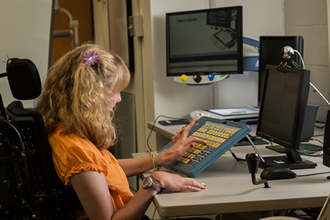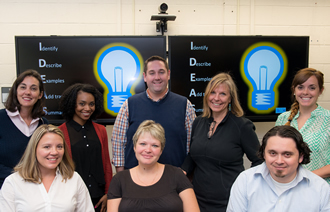Activities/Accomplishments
Major Activities/Accomplishments
The major activities of the KIHd in the past fell into four initiatives in the areas of:
- Early Childhood Initiatives,
- Accommodations and Assistive Technology,
- Technical Assistance and Outreach, and
- Development and Implementation of Model Training Programs.
The Early Childhood Initiatives have been led by Dr. Eva Thorp, Associate Director, and Dr. Sylvia Sanchez. The Multicultural Early Childhood Team Training (MECTT) project, in collaboration with the Parent Education Advocacy Training Center (PEATC), has conducted research and developed and disseminated training materials to improve services to diverse families of young children with special needs by infusing cultural competence in early childhood training programs. The project has been engaged in providing a series of national institutes and is currently seeking funding to train leaders in state education agencies across the nation. Dr. Thorp and Dr. Sylvia Sanchez also developed and implemented a model integrated training program -- the Unified Transformative Early Education Model (UTEEM). UTEEM was a Master's degree program that had three endorsements in Early Childhood Education, Early Childhood Special Education, and English as a Second Language. Five UTEEM students were funded by Higher Horizons, through internship stipends. The impact of this program has been extended through Kaleidoscope, a federally funded special project to develop and disseminate training materials to provide professional and paraprofessional early childhood personnel with the attitudes, knowledge, and appropriate practices necessary to implement inclusive services for diverse young children and their families.
The Accommodations and Assistive Technology initiatives have been reflected in several research and training initiatives. The KIHd, in collaboration with the Office of Equity at GMU, conducted an extensive self-evaluation survey of GMU's efforts and needs in meeting the requirements of the Americans with Disabilities Act (ADA) through access to academic and non- academic programs and services at GMU. The KIHd has also responded to an internal RFP and is currently negotiating to provide assistive technology services to faculty, staff, and students at GMU in collaboration with DSS, DoIIT, GMU Libraries, and Affirmative Action/EEO. This program is designed to provide synergy between the training and research activities of the KIHd and the needs of the GMU community. A related project includes research with a local non-profit agency, Fairfax Opportunities Unlimited (FOU), to research, develop, and evaluate the efficacy of technology based opportunities to employ persons with severe disabilities in community settings and supported employment. A project has also been initiated with Fairfax County Public Schools to develop a program for campus-based training opportunities for college age students still in public schools (much like the Recyle Program at GMU which was started in the KIHd). Dr. Jane Razeghi has developed a model alternative high school program with Fairfax County and Alexandria City public schools to reduce the number of students who do not finish school.
Technical Assistance and Outreach programs continue to be major initiatives of the KIHd. The Training-Technical Assistance Center (T/TAC) is part of a Virginia State Department of Education network of centers designed to deliver high quality training and technical assistance on request at no cost to professionals involved in the education of children with disabilities in the state of Virginia. Technical assistance includes consultation, inservice workshops, resource libraries, information and referral services, newsletters, peer assistance, and long-range planning. VATS North is a joint project between KIHd and Project W.O.R.D. funded by the Virginia Department of Rehabilitation's Virginia Assistive Technology System (VATS) to improve access to assistive technology in Virginia. These projects serve thousands of Virginians each year and also provide support to the training programs in the GSE. A future initiative for national outreach is currently being planned for Spring of 1999. A national conference, "Accommodations in the Workplace and Post-secondary Training Programs: The ADA in Action" will be sponsored by GMU's KIHd, and partners within GMU and the metropolitan D.C. area.
Development and Implementation of Model Training Programs is an area of emphasis in the KIHd over the last three years. The UTEEM and Special Education Licensure Fulfillment (SELF)programs offered licensure and degree programs to over 100 graduate students in areas that would not be available through ledger 1 FTE. New certificate programs in instructional technology have also been developed under this model through the KIHd and are currently being scheduled. Other fee for service training through certificate programs are being developed in conjunction with the Kennedy Institute in Washington D.C. for persons serving adults with developmental disabilities, and an Instructional Technology Certificate Program is underway with the Foundation Schools of Metropolitan D.C., serving children with severe emotional disturbance. While these programs are on Ledger 1, they are completely revenue supported. Additionally, a proposal for a new degree program in alternative education is pending in the GSE.





